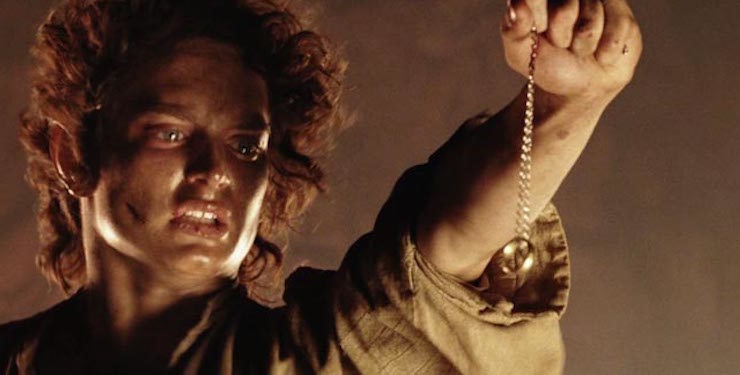You’ve got just one shot to save the kingdom, the love interest, the world, the day. Real life doesn’t usually work like that, but the reason we tell stories isn’t to experience the ordinary. We read to participate in the extraordinary, and we put very high expectations on protagonists. What are they there for if not for redeeming the coupon of salvation?
Of course, it doesn’t always work out that way. Sometimes the day in question had a different savior penciled in on the agenda. Sometimes destiny calls and has to cancel the date at the last minute.
Sometimes it’s better that way.
The Return of the King by J.R.R.Tolkien
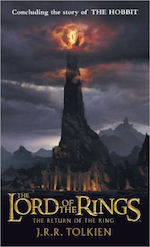 Putting Tolkien on any list of recommended reading is cheating, but I’m doing it anyway. The Return of the King is chockablock with heroes, but when it comes down to undoing the one thing to rule them all, the ultimate task falls to someone you wouldn’t trust with a rubber sword. Of course, there’s a good reason for this. The book is in many was a refutation of violence. Tolkien is still the most recognizable touchstone in fantasy, but that does not change the fact that the character who finally sticks a thumb in the all-seeing eye has a name that sounds like an esophageal disease.
Putting Tolkien on any list of recommended reading is cheating, but I’m doing it anyway. The Return of the King is chockablock with heroes, but when it comes down to undoing the one thing to rule them all, the ultimate task falls to someone you wouldn’t trust with a rubber sword. Of course, there’s a good reason for this. The book is in many was a refutation of violence. Tolkien is still the most recognizable touchstone in fantasy, but that does not change the fact that the character who finally sticks a thumb in the all-seeing eye has a name that sounds like an esophageal disease.
Gateway by Fredrik Pohl
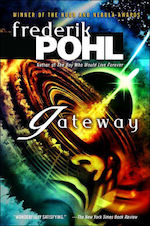 This classic is a must read for its unflinching look at the psychology of the unknown. The protagonist stands on the brink of danger playing the ultimate version of the lady or the tiger, irrevocable choices with extreme outcomes made with minimal information. Just what does it take for Broadhead, a flawed and very ordinary man to bet his life on a toss of the die? Dealing with the long dead Heeche civilization and their incomprehensible technology, Broadhead is in way over his head. He can’t save the day, but he might just gain fabulous wealth, lose everything, or both.
This classic is a must read for its unflinching look at the psychology of the unknown. The protagonist stands on the brink of danger playing the ultimate version of the lady or the tiger, irrevocable choices with extreme outcomes made with minimal information. Just what does it take for Broadhead, a flawed and very ordinary man to bet his life on a toss of the die? Dealing with the long dead Heeche civilization and their incomprehensible technology, Broadhead is in way over his head. He can’t save the day, but he might just gain fabulous wealth, lose everything, or both.
The Jennifer Morgue by Charles Stross
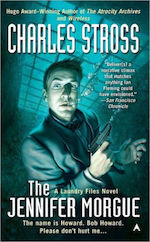 “All the life’s a stage, and we are merely players.” At least that’s what life is like for Bob Howard, a tech support guy in a super-secret agency. He gets his first official taste of field work hunting people who think waking up slumbering Lovecraftian monsters is a good idea. If the Laundry can’t stop Bob from getting involved they might as well give him a license to kill, or at least a learner’s permit. Now if only he could shake this bad case of narrative causality. Even with tongue firmly in cheek, this book has a lot to say about human agency (and secret agency). Even if Bob doesn’t manage to save the day, there’s always the post credit scene with the one who does.
“All the life’s a stage, and we are merely players.” At least that’s what life is like for Bob Howard, a tech support guy in a super-secret agency. He gets his first official taste of field work hunting people who think waking up slumbering Lovecraftian monsters is a good idea. If the Laundry can’t stop Bob from getting involved they might as well give him a license to kill, or at least a learner’s permit. Now if only he could shake this bad case of narrative causality. Even with tongue firmly in cheek, this book has a lot to say about human agency (and secret agency). Even if Bob doesn’t manage to save the day, there’s always the post credit scene with the one who does.
Soon I Will Be Invincible by Austin Grossman
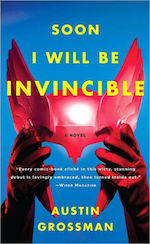 Dr. Impossible begins at a serious disadvantage when it comes to saving the day, considering he is the supervillain of the piece. Despite being the bad guy, he’s in many ways the most heroic character in the story, striving harder and suffering more to achieve his goals than anyone else. This one is worth a read for its off-beat, backward look at the clichés of superhero stories and for its character building. Just don’t expect Dr. Impossible to be to be getting the key to the city at the end. The keys to the handcuffs, on the other hand…
Dr. Impossible begins at a serious disadvantage when it comes to saving the day, considering he is the supervillain of the piece. Despite being the bad guy, he’s in many ways the most heroic character in the story, striving harder and suffering more to achieve his goals than anyone else. This one is worth a read for its off-beat, backward look at the clichés of superhero stories and for its character building. Just don’t expect Dr. Impossible to be to be getting the key to the city at the end. The keys to the handcuffs, on the other hand…
Fahrenheit 451 by Ray Bradbury
 A book that features burning books as a central trope is in a pretty dark place to begin with. Guy Montag, a Fireman employed to perform this villainous task, has second thoughts about his occupation. The story deeply explores the notion of censorship and the dumbing down of media as a form of pacification, which is more relevant today than ever. It’s a dire warning about the seductiveness of the easy path. With nuclear war being a thing in this future, Montag doesn’t manage to save the day, but then who really can save a world without books?
A book that features burning books as a central trope is in a pretty dark place to begin with. Guy Montag, a Fireman employed to perform this villainous task, has second thoughts about his occupation. The story deeply explores the notion of censorship and the dumbing down of media as a form of pacification, which is more relevant today than ever. It’s a dire warning about the seductiveness of the easy path. With nuclear war being a thing in this future, Montag doesn’t manage to save the day, but then who really can save a world without books?
 Curtis Craddock lives in Aurora, Colorado, where he teaches computer information systems to inmates in a state penitentiary. An Alchemy of Masques and Mirrors is his first book. Visit him online at his website or on Twitter @Artfulskeptic.
Curtis Craddock lives in Aurora, Colorado, where he teaches computer information systems to inmates in a state penitentiary. An Alchemy of Masques and Mirrors is his first book. Visit him online at his website or on Twitter @Artfulskeptic.










